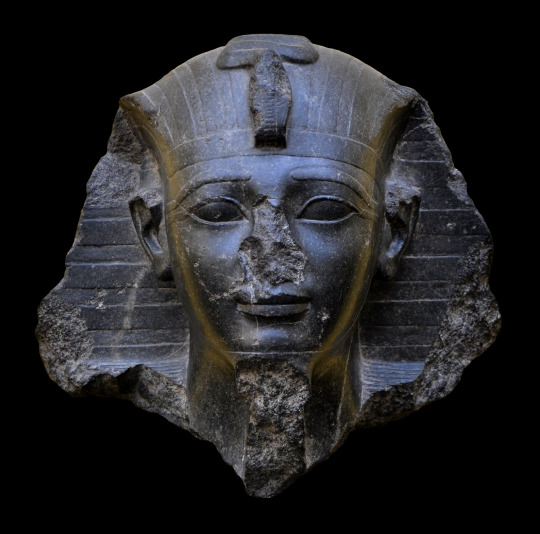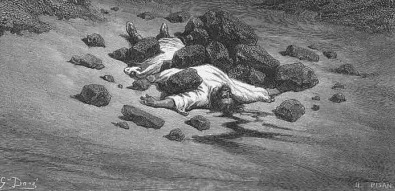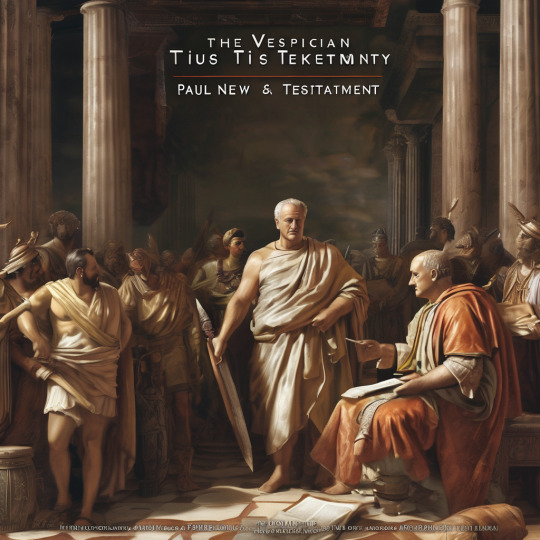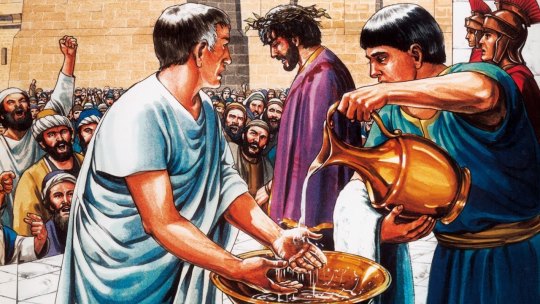#Josephus
Explore tagged Tumblr posts
Text

Amenhotep II New Kingdom, 18th Dynasty, reign of Amenhotep II Ny Carlsberg Glyptotek, Copenhagen, Denmark Who was the Pharaoh of the Exodus? There are various theories. However, by examining the evidence found in ancient recorded history, it is surprisingly clear to establish just who the Exodus Pharaoh was. In "The Exodus Pharaoh EXPLAINED," Archeologist and Professor Joel Kramer shows us that Amenhotep II was indeed the Pharaoh of the Exodus.
#Amenhotep ii#egyptian#egypt#world history#bust#pharaoh#exodus#bible#art#history#amenhotep#joel kramer#the exodus#diorite#18th dynasty#new kingdom#ancient egypt#head of a pharaoh#background blacked out#ancient historian#roman#josephus
62 notes
·
View notes
Text
youtube
Look inside the Second Temple of Jerusalem with new discoveries.
3 notes
·
View notes
Text
Non-Christian sources confirm the validity of New Testament
The Jewish historian, Flavius Josephus (A.D. 37-100), is the first non-Christian author to mention Jesus. In the Antiquities, Josephus writes:
There was about this time Jesus, a wise man, if it be lawful to call him a man, for he was a doer of wonderful works—a teacher of such men as receive the truth with pleasure. He drew over to him both many of the Jews, and many of the Gentiles. He was Christ; and when Pilate, at the suggestion of the principal men amongst us, had condemned him to the cross, those that loved him at the first did not forsake him, for he appeared to them alive again the third day, as the divine prophets had foretold these and ten thousand other wonderful things concerning him; and the tribe of Christians, so named from him, are not extinct at this day (Antiquities 18:3:3).
Tacitus (A.D. 56-120), the Roman historian confirms that the crucifixion of Jesus actually took place. Writing in his Annals, he records:
Consequently, to get rid of the report, Nero fastened the guilt and inflicted the most exquisite tortures on a class hated for their abominations, called Christians by the populace. Christus, from whom the name had its origin, suffered the extreme penalty during the reign of Tiberius at the hands of one of our procurators, Pontius Pilatus, and a most mischievous superstition, thus checked for the moment, again broke out not only in Judæa, the first source of the evil, but even in Rome, where all things hideous and shameful from every part of the world find their centre and become popular. Accordingly, an arrest was first made of all who pleaded guilty; then, upon their information, an immense multitude was convicted, not so much of the crime of firing the city, as of hatred against mankind.
Pliny the Younger (A.D. 62-113), Roman governor in Asia Minor, established that early Christians worshiped Jesus as a god:
They (Christians) were in the habit of meeting on a certain fixed day before it was light, when they sang in alternate verses a hymn to Christ, as to a god, and bound themselves by a solemn oath, not to any wicked deeds, but never to commit any fraud, theft or adultery, never to falsify their word, nor deny a trust when they should be called upon to deliver it up; after which it was their custom to separate, and then reassemble to partake of food, but of an ordinary and innocent kind (Epistles 10.96).
Suetonius (120 AD) was a Roman historian and court official. When recounting the history of the emperor Claudius some years before him, he said,
“Because the Jews at Rome caused constant disturbances at the instigation of Chrestus [Christ], he [Claudius] expelled them from the city [Rome]” (Life of Claudius, 25:4).
Lucian, born (c. AD 125 – 180), the pagan author Samosata, while ridiculing Christians, accepted that Jesus actually existed:
The Christians, you know, worship a man to this day—the distinguished personage who introduced their novel rites, and was crucified on that account. … You see, these misguided creatures start with the general conviction that they are immortal for all time, which explains their contempt of death and voluntary self-devotion which are so common among them; and then it was impressed on them by their original lawgiver that they are all brothers, from the moment that they are converted, and deny the gods of Greece, and worship the crucified sage, and live after his laws. All this they take quite on faith, with the result that they despise all worldly goods alike, regarding them merely as common property. (Lucian, The Passing of Peregrinus)
Celsus (2nd century), the Greek philosopher, while arguing against Christianity, also accepted that Jesus existed:
O light and truth! He distinctly declares, with his own voice, as ye yourselves have recorded, that there will come to you even others, employing miracles of a similar kind, who are wicked men, and sorcerers; and Satan. So that Jesus himself does not deny that these works at least are not at all divine, but are the acts of wicked men; and being compelled by the force of truth, he at the same time not only laid open the doings of others, but convicted himself of the same acts. Is it not, then, a miserable inference, to conclude from the same works that the one is God and the other sorcerers? Why ought the others, because of these acts, to be accounted wicked rather than this man, seeing they have him as their witness against himself? For he has himself acknowledged that these are not the works of a divine nature, but the inventions of certain deceivers, and of thoroughly wicked men.
~ Samples, Kenneth Richard. ‘Without a Doubt: Answering the 20 Toughest Faith Questions
11 notes
·
View notes
Text

Perhaps the most blunt, heavy-handed and in-your-face introduction to a fanfic OC version of an existing character ever.
The sheer ridiculousness of showing up in the flashiest way possible and having your nametag and personal description being written on your forehead (which, in the modern age, would probably include personal pronouns).
5 notes
·
View notes
Text

Honi the Circle Maker, by Chana Rivka Burke
An incident occurred in which the people said to Ḥoni HaMe'aggel: "Pray that rain should fall." He said to them: "Go and bring in the clay ovens used to roast the Paschal lambs, so hat they will not dissolve in the water, as torrential rains are certain to fall." He prayed, and no rain fell at all. What did he do? He drew a circle on the ground and stood inside it and said before God: "Master of the Universe, Your children have turned their faces toward me, as I am like a member of Your household. Therefore, I take an oath by Your great Name that I will not move from here until You have mercy upon Your children and answer their prayers for rain." Rain began to trickle down, but only in small droplets. He said: "I did not ask for this, but for rain to fill the cisterns, ditches, and caves with enough water to last the entire year." Rain began to fall furiously. He said: "I did not ask for this damaging rain, either, but for rain of benevolence, blessing, and generosity. Subsequently, the rains fell in their standard manner but continued unabated, filling the city with water until all of the Jews exited the residential areas of Jerusalem and went to the Temple Mount due to the rain. They came and said to him: "Just as you prayed over the rains that they should fall, so too pray that they should stop." He said to them: "Go out and see if the Claimants' Stone" —a large stone located in the city, upon which the proclamations would be posted with regard to lost and found articles— "has been washed away." (In other words, if the water has not obliterated the Claimants' Stone, it is not yet appropriate to pray for the rain to cease.) Shimon ben Shetaḥ, the Nasi of the Sanhedrin at the time, relayed to Ḥoni HaMe'aggel: "Were you not Ḥoni, I would have decreed that you be ostracized, but what can I do to you? You nag God and He does your bidding, like a son who nags his father and his father does his bidding without reprimand. After all, rain fell as you requested."
Tractate Ta'anit 19a:6b-9a
Hyrcanus then began his high priesthood […] when presently [his younger brother] Aristobulus began to make war against him, and as it came to a battle with Hyrcanus at Jericho, many of his soldiers deserted him, and went over to his brother; upon which Hyrcanus fled into the citadel, where Aristobulus's wife and children were imprisoned by their mother, as we have said already, and attacked and overcame those of his adversaries that had fled thither, and lay within the walls of the Temple. [...] Now there was one, whose name was Onias [Greek for Ḥoni]; a righteous man he was, and beloved of God, who, in a certain drought, had prayed to God to put an end to the intense heat, and whose prayers God had heard, and had sent them rain. This man had hid himself, because he saw that this sedition would last a great while. However, they brought him to the Judean camp, and desired that, as by his prayers he had once put an end to the drought, so he would in like manner make imprecations on Aristobulus and those of his faction. And when, upon his refusal, and the excuses that he made, he was still by the multitude compelled to speak, he stood up in the midst of them and said, "O God, the King of the whole world! Since those that stand now with me are Thy people, and those that are besieged are also Thy priests, I beseech Thee, that Thou wilt neither hearken to the prayers of those against these, nor bring to effect what these pray against those." Whereupon such wicked Judeans as stood about him, as soon as he had made this prayer, stoned him to death.
Josephus, The Antiquities of the Jews (XIV.1.2, XIV.2.1)

#Judaism#tzadikim#miracles#Talmud#martyrs#martyrdom#Honi the Circle Maker#Hasmonean Civil War#Josephus
3 notes
·
View notes
Text
Josephus
Josephus was a Jewish historian who lived in the first century AD. He is widely regarded as one of the most important historians of his time, and his works have been studied and analyzed for centuries. However, many people today are not familiar with Josephus and his contributions to history. It is important to learn about Josephus because he provides valuable insights into the political and…

View On WordPress
1 note
·
View note
Text
#TheHolzhofEnchantment #WritingCommunity Artwork
First Earth Battalion Chime Element Nuremberg Franconia Nuremberg Suedstadt Sebaldus Kirche Nuremberg Sebaldus Kirche Nuremberg Sebaldus Kirche Nuremberg Sebaldus Kirche Nuremberg Celestial Phenomenon Crash Site Sebalder Reichs Wald Celestial Phenomenon Crash Site Sebalder Reichs Wald Dondon Holzhof Star Wars & Nuremberg Lore Fanart A Call To Action

View On WordPress
#Armory#City Walls#Donald J Trump#Droid#First Earth Battalion#Franconia#Handwerkerhof#Jawas#Josephus#Mauer#Middle Franconia#Nuremberg#R2D2#Sebald#Sebald Church#Sebbie#Snit Sebald#Suedatadt Nbg#The Holzhof Enchantment
0 notes
Text
The Egyptians, the Chaldeans, and the Phoenicians (to say nothign for the moment of ourselves) have by their own account an historical record rooted in tradition of extreme antiquity and stability. For all these peoples live in places where the climate causes little decay, and they take care not to let any of their historical experiences pass out of their memory. On the contrary, they religiously preserve it in their public records, written by their most able scholars. In the Greek world, however, the memory of past events has been blotted out.
-- Flavius Josephus
1 note
·
View note
Text
Was Jesus a Pharisee?
The Pharisees were really more of a political party than they were a separate sect. However, they appealed to very religious aspects of life and the theology of the people in that they emphasized that the people remain Jewish in the midst of the secular culture of that day. They developed elaborate rules and laws for the Jews to remain ritually pure, but they also thought about the latest…
#antiquity#backgrounds#Bible#biblical#Christ#Eleazer#essenes#hillel#Hyrcanus#Jesus#John#Josephus#leaders#Pharisees#religious#Sadducees
1 note
·
View note
Text
The Vespasian Conspiracy: Unraveling the Narrative of Paul, Titus, and the New Testament

Introduction The New Testament is often viewed as a sacred text, inspired by divine revelation. However, an alternative perspective suggests a more politically motivated origin, positing that the Vespasian family, particularly Vespasian and his son Titus, played a crucial role in shaping its narrative. This theory posits that these Roman figures not only influenced the creation of biblical texts but also funded the key players within early Christianity to fulfill their prophecies and solidify their power. Central to this narrative are Paul the Apostle, who emerges as a prominent figure in the early church, and Titus, whose military conquests echo the themes of divine judgment and renewal present in the biblical texts. Additionally, the figure of Josephus, a well-educated Jewish historian who found himself in the employ of the Vespasian family, serves to highlight the intricate connections between power, faith, and historical narrative. The Vespasian Family and Roman Political Strategy Vespasian, who became Emperor in 69 AD, ascended to power during a tumultuous period known as the Year of the Four Emperors. He solidified his authority through military might and political cunning. His son, Titus, gained fame for his role in the Jewish War, particularly for his leadership during the Siege of Jerusalem in 70 AD. This catastrophic event led to the destruction of the Second Temple, a pivotal moment in Jewish history. The Vespasian family had vested interests in the outcome of the Jewish War. By influencing early Christianity, they could pacify Jewish dissent and promote a version of faith that aligned with Roman values. The idea that the Vespasian family wrote the Bible and manipulated key players serves as a compelling narrative that underscores the intertwining of religion and politics. Paul: The Apostle as a Roman Operative Paul the Apostle emerges as a critical figure in the New Testament, often referred to as the "Apostle to the Gentiles." His letters, which comprise a significant portion of the New Testament, emphasize grace, faith, and the inclusion of non-Jews into the faith. However, if we consider the theory that he was a pawn in a grander scheme orchestrated by the Vespasian family, his role becomes more complex. Paul was a Roman citizen with an elite education, allowing him to navigate both Jewish and Greco-Roman cultures effectively. His dual identity enabled him to promote a version of Christianity that was palatable to both Jewish and Roman audiences. The question arises: Was Paul genuinely a devoted servant of Christ, or was he an operative serving the interests of a powerful family seeking to control the burgeoning Christian movement? The Letters as Political Documents When examining Paul’s epistles, it is essential to consider their historical context. His letters often address issues faced by early Christian communities, emphasizing unity and inclusion. However, they also reflect a strategic approach to establishing authority and legitimacy. For instance, Paul’s declaration in Galatians 3:28—"There is neither Jew nor Gentile, neither slave nor free, nor is there male and female, for you are all one in Christ Jesus"—serves to unify diverse communities under the banner of Christianity. This rhetoric can be viewed as a means of mitigating tensions within a society grappling with ethnic and class divisions. Moreover, the theological concepts introduced by Paul, such as grace and redemption, could have been designed to distance the new faith from traditional Jewish beliefs, making it more acceptable to Gentiles. If we consider this in light of the Vespasian conspiracy, Paul’s role as a cultural interpreter takes on a new meaning—one where he acts as a facilitator of Roman authority rather than a mere servant of Christ. Titus: The Roman General and His Biblical Mention Titus, son of Vespasian, is a pivotal figure in both history and the biblical narrative. He played a key role in the Roman siege of Jerusalem, ultimately overseeing the destruction of the Second Temple. In the biblical narrative, he is mentioned as a significant leader who aids the early Christian church, yet his portrayal serves to reinforce the narrative that aligns with Roman interests. The mention of Titus in the New Testament, particularly in the Book of Titus, positions him as a legitimate figure within the early church. His character embodies the Roman ideals of strength and leadership while simultaneously providing a connection to the emerging Christian faith. This convenient mention suggests that the Vespasian family sought to legitimize their power by intertwining their lineage with the nascent Christian movement. The Context of Biblical Writings The timing of the writings in the New Testament is significant. The Gospels and Paul’s epistles were composed during a period when the Roman Empire was consolidating its power over the regions once held by the Jewish nation. By framing the narrative in a way that emphasizes grace, redemption, and the eventual triumph of Christianity, the Vespasian family could position themselves as benefactors of a faith that was beginning to spread throughout the empire. Furthermore, the destruction of the Second Temple and the subsequent loss of Jewish sovereignty created a vacuum that early Christianity sought to fill. In this context, the Vespasian family’s involvement in shaping the narrative becomes even more critical, as it aligns their interests with the emerging Christian faith. Josephus: The Scholar and Roman Collaborator Flavius Josephus, a Jewish historian, adds another layer to this intricate narrative. Initially a commander in the Jewish forces during the revolt against Rome, Josephus was cornered by Roman troops and found himself in a dire situation. In a moment of desperation, he surrendered to the Romans, ultimately becoming a collaborator with the Vespasian family. His transformation from a Jewish leader to a historian chronicling Roman victories is emblematic of the broader themes of power and subjugation present during this period. Josephus’ works, particularly "The Antiquities of the Jews" and "The Jewish War," offer invaluable insights into Jewish history and the context surrounding the emergence of Christianity. However, his role as a historian in service of the Roman Empire raises questions about the authenticity and reliability of his accounts. By writing from a Roman perspective, Josephus may have inadvertently shaped the narrative that contributed to the legitimization of Roman rule over the Jewish people. His writings provide a historical backdrop that complements the biblical texts, suggesting that the early Christian narrative may have been carefully crafted to align with the political interests of the Vespasian family. By presenting the destruction of the Second Temple as a form of divine judgment, both Josephus and the emerging Christian narrative could effectively justify the Roman conquest and the establishment of Christian authority. The Theological Implications: A New Order Paul’s writings often emphasize themes of submission and authority, with passages like Romans 13:1-2 urging believers to "be subject to the governing authorities." This directive raises questions about the intentions behind Paul’s teachings. If Paul was operating under the influence of the Vespasian family, his emphasis on submission to Roman authority could be seen as a strategic move to quell dissent and promote a harmonious relationship between Christians and the empire. Moreover, Paul’s portrayal of himself as a "fool for Christ" (1 Corinthians 4:10) suggests a paradoxical embrace of weakness in the face of power. This duality aligns with the Vespasian family’s need to present Christianity as a counter-cultural movement that ultimately serves the interests of the empire. By portraying himself as a humble servant, Paul could effectively appeal to the marginalized while simultaneously serving the interests of the powerful. Conclusion: The Interplay of Power and Faith The narrative that suggests the Vespasian family wrote the Bible and influenced key figures like Paul, Titus, and Josephus raises important questions about the intersection of faith and politics. While the New Testament is often viewed as a divinely inspired text, considering its potential political motivations reveals the complexities of early Christianity’s development. In this view, Paul emerges not merely as a servant of Christ but as a strategic player in a broader scheme orchestrated by the Vespasian family. His writings reflect the tension between faith and power, illustrating how early Christians navigated a world shaped by Roman authority. Similarly, Titus’ convenient mention in biblical texts serves to solidify the connection between the emerging Christian faith and the Roman Empire, while Josephus’ role as a historian reinforces this narrative. Ultimately, the story of Paul, Titus, Josephus, and the Vespasian family invites us to reflect on the ways in which power dynamics influence religious narratives, shaping the beliefs and practices of communities throughout history. By uncovering these connections, we gain a deeper understanding of the socio-political context that gave rise to the early Christian movement and the lasting impact of these figures on the course of history. Read the full article
#biblicalhistory#Christianity#JewishWar#Josephus#NewTestament#Paul#politicalinfluence#RomanEmpire#Titus#Vespasian
0 notes
Text
"But one may justly ascribe this act to Cherea; for although many concurred in the act itself, yet was he the first contriver of it, and began long before all the rest to prepare for it, and was the first man that boldly spake of it to the rest; and upon their admission of what he said about it, he got the dispersed conspirators together; he prepared every thing after a prudent manner, and by suggesting good advice, showed himself far superior to the rest, and made obliging speeches to them, insomuch that he even compelled them all to go on, who otherwise had not courage enough for that purpose; and when opportunity served to use his sword in hand, he appeared first of all ready so to do, and gave the first blow in this virtuous slaughter; he also brought Caius easily into the power of the rest, and almost killed him himself, insomuch that it is but just to ascribe all that the rest did to the advice, and bravery, and labors of the hands of Cherea." - Flavius Josephus
I love how he describes the ways in which Chaerea was competent. Cassius is haunting this.
1 note
·
View note
Text
youtube
Excavations in Caesarea Maritima have revealed the prison where St. Paul was held, below the Governor’s Palace. Archaeologists are still searching & have found prayers of a Christian pleading for mercy inscribed within the dungeon.
#WalktheBible#CaesareaMaritima#Caesarea#PontiusPilate#Josephus#HerodtheGreat#KingHerod#SharonPlain#CaesareaNationalPark#IsraelParks#IsraelNationalParks#ChristianArchaeology#Excavations#BiblicalArchaeology#BiblicalHistory#Israel#visitisrael#holyland#bibletravel#christiantravel#israelinstagram#israeloftheday#israeltrip#israelgram#biblicaltravel#IsraelViews#ChristianPilgrimage#ChristianTraveller#StPaulsPrison#StPaul
2 notes
·
View notes
Text
Philo’s record of the Jews complaining
Josephus, as we have seen, records crowds appealing directly to Pilate over a contentious matter. According to all four Gospels, it is a crowd led by the Sanhedrin that assembles before the praetorium in Jerusalem to appeal directly to Pilate for Christ to be executed (Matthew 27:17; Mark 15:8; Luke 23:1; John 18:28). Philo’s record of the Jews complaining over Pilate’s head to Caesar about Pilate substantiates the Gospel of John’s record of the Jews’ threat that Pilate’s failure to execute Christ for claiming to be a king will reach Emperor Tiberius’ ears (John 19:12). This in turn explains why all the Gospel writers record that though Pilate saw Christ as innocent and tried to absolve him, he was intimidated by the crowd that not only could appeal against his decision, but could also riot (Matthew 27:24; Mark 15:15; Luke 23:23; John 19:15-16). With a track record of mistakes in his handling of the Jews, Pilate could ill afford another diplomatic incident.

~ Peter Harris
8 notes
·
View notes
Text
Did People Really Live Hundreds Of Years?
Dale Pollard (Genesis 5) Genesis records those who lived for hundreds of years and it’s nearly unbelievable for some people and for others— it is. Look at some examples from Genesis chapter five: V.17 “Thus all the days of Mahalalel were 895 years, and he died.” V.20 “Thus all the days of Jared were 962 years, and he died” V.27 “Thus all the days of Methuselah were 969 years, and he…

View On WordPress
0 notes

